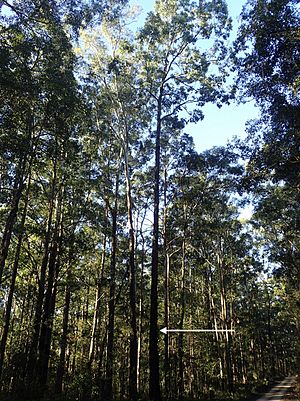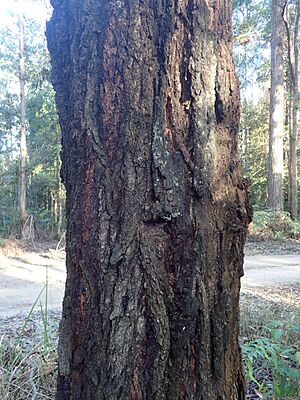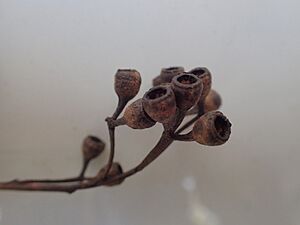Nambucca ironbark facts for kids
Quick facts for kids Nambucca ironbark |
|
|---|---|
 |
|
| Eucalyptus fusiformis (arrowed) in the Bongil Bongil National Park | |
| Scientific classification | |
| Genus: |
Eucalyptus
|
| Species: |
fusiformis
|
The Nambucca ironbark (Eucalyptus fusiformis) is a special tree. It is also known as the grey ironbark. This tree grows only in eastern Australia. It has thick, dark, "ironbark" on its trunk and branches. Its leaves are long and curved. The tree produces white flowers and unique pear-shaped fruits.
Contents
What the Nambucca Ironbark Looks Like
The Nambucca ironbark is a tall tree. It can grow up to 30 meters (about 98 feet) high. It has very thick, hard, greyish bark. This bark covers its trunk and larger branches.
Young Nambucca ironbark plants have special stems. These stems are almost square. Their leaves are shaped like an egg or a wide spear. They are about 4 to 9 centimeters (1.5 to 3.5 inches) long.
Adult leaves are long and curved. They are dull green on both sides. These leaves can be 7.5 to 17.5 centimeters (3 to 7 inches) long. They are about 1.3 to 2.6 centimeters (0.5 to 1 inch) wide.
Flowers and Fruit
The tree's flower buds grow in groups of seven. They are found at the ends of the branches. Each bud is oval or spindle-shaped. They are about 5 to 9 millimeters long.
The Nambucca ironbark flowers between May and August. Its flowers are white. After flowering, the tree produces woody fruits. These fruits can be shaped like a half-sphere, a cone, or a pear. They are about 5 to 12 millimeters long.
How the Nambucca Ironbark Got Its Name
The Nambucca ironbark was first officially described in 1987. Two scientists, Douglas Boland and David Kleinig, named it. They wrote about it in a science journal called Brunonia.
The scientific name fusiformis comes from Latin words. It means "spindle-shaped." This name describes the shape of the tree's flower buds.
Where the Nambucca Ironbark Grows
This ironbark tree lives in forests. You can find it in northern New South Wales. It grows near a town called Kempsey, New South Wales. It also grows north into southeastern Queensland. You can find it near a place called Mount Barney.



